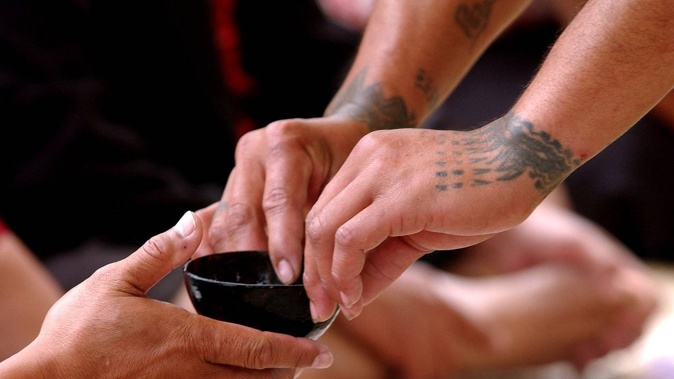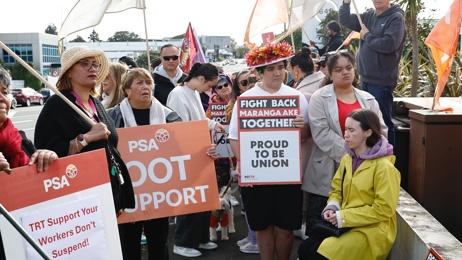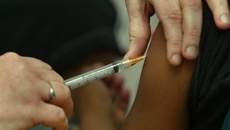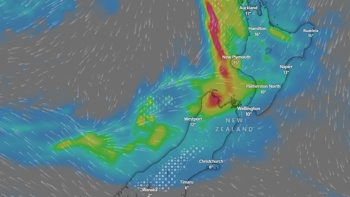
It is a plant with thousands of years of use and with deep cultural roots in the Pacific.
Now a team of New Zealand researchers are set to study kava - and its use in traditional settings - as a way to heal those living with trauma.
While the plant, the root of which is mixed in water and consumed across the Pacific, has been packaged and sold in supplements for years, its use in cultural spaces has been largely ignored by the pharmaceutical companies that sold it around the world as a relaxant and sleep aid.
Now Pacific health researcher Dr Apo Aporosa and Pacific mental health nurse lecturer Dr Sione Vaka from the University of Waikato will co-lead a study to assess the efficacy of kava when consumed alongside talanoa, the open and respectful dialogue that accompanies kava drinking in formal and informal settings.
The clinical trials will take three years, focusing on first responders, corrections staff and military personnel who have seen combat and they will be supported by a nearly $1 million grant from the Health Research Council.
Aporosa said he was “extremely grateful” to have the research funded. “This could save people’s lives,” he told the Herald.
But the former police officer turned academic noted that the development was “bittersweet”.
“It’s likely we’re going to spend a million dollars to prove what traditional Pacific knowledge has been trying to tell Europeans for the last 200 years,” he told the Herald.
He said he relished the opportunity to prove the efficacy of faikava (the traditional sharing of kava and conversation) in treating Post-Traumatic Stress Disorder (PTSD) and heal more broken people by inviting them into the kava circle.
“I’m so stoked that Health Research Council has faith in us as a team to do this critically important work because it’s not just me, it’s the entire team,” Aporosa told the Herald.
‘We’re not here to make money’
The WHO reports that around 10 per cent of New Zealanders will experience PTSD but our first responders, corrections officers and military personnel suffer at much higher rates.
Aporosa, a former soldier and police officer who left the force due to PTSD, has spent years exploring the role of kava and talanoa in relieving the symptoms of trauma.
That experience - speaking with military and police around the world - coupled with his own personal journey, led to Aporosa being awarded a Fulbright Scholarship last year to study the subject further in Hawai’i.
That work will help inform the clinical study.
Aporosa said one aim of the research was to produce a guide that could be used by those struggling with PTSD and other mental health issues, without the need for direct intervention from a psychologist and outside of what, he said, could be a Eurocentric framework.
“Our goal is that, following the clinical trials, you and your friend will be able to download a free book that explains how we do the intervention.”
“We’re potentially providing a form of therapy that people are going to be able to easily replicate, by simply sitting with friends and drinking a traditional substance that allows for quality conversation as it doesn’t cause euphoria or disinhibit like alcohol or cannabis.”
/cloudfront-ap-southeast-2.images.arcpublishing.com/nzme/TOLFKE45DBBJZCJIICOMFYBUQU.jpg)
Kava being mixed at the Pacific 'powhiri' during the 2023 University of Waikato Orientation Week. Photo / Dave Duffin
“I don’t imagine that the pharmaceutical industry is going to be impressed if we can show traditional kava use can reduce PTSD symptoms, particularly as kava is cheap and easy to access.”
“We’re not here to make money, we’re here to bring mental health to people, to reduce PTSD.
“You shouldn’t have to pay for that.”
Asked what faikava might look like in a New Zealand context, Aporosa said it was important that the spaces observe some of the fundamental tikanga that exists across the Pacific.
He used the custom of sitting on the floor as an example.
“Pacific peoples have always sat on the floor. That’s not because we didn’t know how to make chairs, it’s because this is important to us culturally, about being able to look across the space at each other with us all at the same level, sitting on the floor, showing respect.”
But however these gatherings operate, Aporosa said the kava itself should not be the focus.
He said focus on the substance becomes a “point of fixation”.
“It’s almost like the liquid in the bowl is the exotic other. What the onlooker fails to recognise is that the kava in the bowl plays a critical role in facilitating relational connection.”
The study
The clinical study aims to follow six groups of first responders, police and post-combat military who are living with trauma, with the majority coming from our Pasifika communities.
The groups will be split between male and female and participants will be assessed by psychologists before, during and after the process.
/cloudfront-ap-southeast-2.images.arcpublishing.com/nzme/6WR4UMZ6DIZENLLYTZ53FLII7Y.jpg)
A bowl of kava is prepared at Vatukacevaceva village in the north of the island of Viti Levu, Fiji. Photo / Alan Gibson
Two groups (one male, one female) will receive what Aporosa calls the “full package” and take part in kava sessions that include talanoa.
Two other groups will engage in talanoa without the kava and the final two will take a standardised dose of kavalactones (the active ingredients in kava) in capsule form and not engage in any talanoa.
He described the groups as an organic space, saying clinical psychologists will be there for safety and won’t run the sessions.
“We do know that CBT or talk therapy works for some PTSD cases,” Aporosa said, adding that talanoa could function as talk therapy.
“We know that kava has relaxant properties, that kava is a natural anti-anxiety medication, so we combine those two elements in a culturally influenced space, and we’ve got something here that’s unique.”
An unmet need
Rates of PTSD are higher in our Pasifika and Māori communities and Aporosa noted that many face financial barriers to seeking treatment.
“So they’re living with trauma and having to do the best that they can.
“Kava provides them with a therapy, an indigenous, culturally based therapy and medicine, all in one.”
/cloudfront-ap-southeast-2.images.arcpublishing.com/nzme/YR5J7YZZSIG4PN6P56MVDUWJZI.jpg)
Kava forms a central part of maintaining relational connections across the Pacific, and the Pacific diaspora. Photo / Getty Images
Not having to meet what can be a high bar of entering into the potentially expensive and Eurocentric practice of psychotherapy is not the only benefit that kava offers, with Aporosa also noting a more universal advantage.
He cites avoidance as a major barrier to seeking treatment and kava can help those living with trauma who are often reluctant to relive it through therapy.
He told the Herald that he had learned from working with post-combat soldiers that the drink allowed participants to share without feeling panicky or numb.
“You still feel the emotions but those emotions are not overwhelming.
“That’s one of the keys to this intervention, what makes it novel.”
He said the clinical trials will help the team understand it more but believes the experience is a “package deal” that requires the cultural values and practice and the talanoa or talk therapy.
“It’s not solely the kava.”
Women and kava
The study’s 50/50 gender split will see women as active participants in the faikava, a reality not seen in some Pacific communities.
Aporosa told the Herald that this adherence to tradition was causing women to miss out.
“We’re doing some of our Pacific women a disservice by not allowing them into these spaces or prohibiting them,” he said.
“We’re supposed to have values that are inclusive and welcoming, but we’re actually working against us like we’ve recolonised our minds and bought into some of this BS that’s going on.”
Anau Mesui-Henry, who will join the study as a PhD student, was raised around kava as the daughter of a Tongan kava merchant and said she was raised seeing women at the faikava only as touʻa, the woman serving the kava.
She argued that the role offered some benefits for women, sometimes allowing them to use it as a way to raise funds, but also said that women drinking kava was becoming more acceptable in Tonga, as it is in other Pacific societies.
She said the “cultural classroom” of the faikava allowed men to be open and to share and learn but women were still determining how that space will work for them.
“We’re kind of establishing what that space feels, looks like for us,” she said.
Mesui-Henry recently organised a series of Kava-X sessions, events where participants share kava and stories of mental health and healing - and where Pacific traditions were at play at a deep level.
/cloudfront-ap-southeast-2.images.arcpublishing.com/nzme/P6TXADGDDZHSXC26RNIYM62LVQ.jpg)
Anau Mesui-Henry, PhD student exploring kava as a treatment for mental health. Photo / Todd Henry
She told the Herald a lot of those traditions were currently missing from similar events put on for her community, saying many had the trappings of tradition but still observed a Western framework that had been ‘browned up’.
“A lot of people will be like, ‘this is cultured’ but all I see is the food, the karakia and the brown person,” she said.
“But where are our cultural philosophies or our cultural concepts?”
Mesui-Henry said the Tongan community had been largely supportive but offered a firm response to critics of her efforts to open up the faikava.
“I grew up in this, you want me to change my story?” she told the Herald.
She said she had seen the power of the kava space to bring disparate groups together at Four Shells, the kava lounge she runs with her husband Todd Henry.
“For me it’s magical,” she said of the process of people connecting over the bitter beverage.
“I’ve seen how people were sometimes not even realising that that’s happening”.
A fresh look at mental health
Aporosa said he expected that the intervention would have its critics, “particularly from those who view traditional medicinal knowledge as lacking authority or being primitive”.
“But I would say to those people, look at the failure of expensive Western medicine in the treatment of PTSD.
“If we keep doing what we’ve always done, we’re going to get what we’ve always got. That’s the reality.
“It’s time to recognise that there are some amazing potentials in indigenous knowledge and indigenous medicines.”
“We need to start thinking about our fellow humans instead of our wallet. Good mental health and relational connection should never be driven by money, it should be driven by character, integrity, the desire to see others healed, be in healthy relationships and living full lives.”
Chris Marriner is an Auckland-based journalist covering trending news and social media. He joined the Herald in 2003 and previously worked in the Herald’s visual team.
Take your Radio, Podcasts and Music with you









